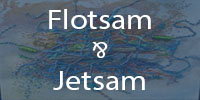— a semi-regular humor column by Maurice Austin —
One benefit of the recent Washington State Fish and Wildlife Commission decision to allow the salvaging of road-kill deer and elk is that the Horseshoe Highway might begin to smell better. The past couple of years, there’s always been a slight stink in one ditch or another along the route I walk or run—particularly nose-hair-curling in the summer months.
In July, it became permissible to salvage roadside cadavers, pre-seasoned with a special blend of Horseshoe Highway dry-rub consisting of reflective paint flakes and powdered brake-shoe lining. But by law we’re confined to salvaging deer and elk, and since there aren’t many elk on the island, deer it is.
Of course, such pungent fragrance also attracted vultures and eagles, which depend on the discarded harvests of our hurried commute for their weekly sustenance. Alas, the losers in the revised road-kill law might be just those avian scavengers, since what was once left alongside the road for the birds might now be borne home, skinned and hung, neatly packaged and tucked in among the last frost-bitten packets of last year’s pink salmon catch.
It used to be that so many deer ended up in the ditches that I was convinced their bones posed a risk to the integrity of the roadside drainage system, threatening to clog the culverts and overload the alluvial plains such that the island would effectively gain acreage, or at least become slightly buoyant, held afloat by the marrow in the bleached bones of deer killed by Cougars, Mustangs, Explorers, and Silverados.
But now the roads seem to smell sweeter, and the vultures wheel in the distance, generally, rather than lurking in trees right alongside the road, in that spot you know to hold your breath while looking down into the ditch, amazing how quickly they can take a carcass down to hide and bone, how quickly the gore gives to grass and gone.
Of course, there’s plenty to entertain the highway scavengers besides. Small birds can frequently be seen, nose in wing, as if ashamed to be caught dead on the shoulder alongside the discarded Starbucks cups and Rainier cans. A flattened snake’s scales glint like a chain of miniature silver coins in the sunlight. A rabbit’s paws clenching at the afterlife look not so lucky smeared among the contents of its bowels, but might be good for a bite or two.
One problematic aspect of the new “between-the-lines” year-round hunting season is that animals thus harvested must be taken in whole—entrails and hooves and mashed-in head and all. And disposed of properly, of course, leaving those hoping for nothing other than crab-pot fodder in a bit of a legal limbo, not specifically outlawed from stuffing their bait-boxes with venison, but not specifically granted such a right, either.
Another inevitable effect is that soon firearms manufacturers might begin marketing “deer hunter” brush guards and wheel-well aftermarket parts, so that your F-150 can become a more effective harvesting tool. And how long will it take, then, given that industry’s likewise inevitable slip from the practical to the tactical, until Bushmaster starts producing “Night Stalker” carbon-fiber hood ornaments capable of accepting 30-round magazines?
An additional concern, depending upon your available instrument of transportation, is that while an island deer carcass might fit comfortably in the back of your SUV, it might not fit in the back of your Prius, and even if you get it stuffed in there, who knows if the thing’s really dead, might wake up just as you’re taking the corner there at Fowler’s Pond, and start kicking and writhing and making cell-phone calls to its lawyer or the American Society for the Prevention of Cruelty to Animals (ASPCA), and then where would you be?
Perhaps this law doesn’t quite go far enough. By my humble calculations, I walked by several meals today, spread out on the shoulder, maybe a bit worse for the contact with bumper, tire, or quarter-panel, but there’s good eats in a properly-prepared squirrel, and plenty of stew-meat in your average Orcas rabbit. Not that I would look forward to eating otter, which smell bad enough when alive, or raccoon, which are so full of grease they’ll set your BBQ aflame, or much else locally, but still. Some of these local squirrel are pretty well-fed, and apparently conditioned to run out into the street, then off the street, then back into the street, then off, and back again just to leave you looking in the rear-view mirror as you pass, uncertain if dinner’s set or not.
It’s the scavenger birds I really worry about, since on my latest walks they’re suddenly circling closer, sticking with me as I huff up the hill, waiting, I suspect, for the table to be set with something that won’t be dragged away, waiting for me, I suspect, patiently.
Your calories may vary.
**If you are reading theOrcasonian for free, thank your fellow islanders. If you would like to support theOrcasonian CLICK HERE to set your modestly-priced, voluntary subscription. Otherwise, no worries; we’re happy to share with you.**








We needs us some tasty ‘possums here abouts. Time to Facebook your crashed culinary creations.
Having contributed more than my share of Deer in the ditch, I enjoy your real life humor! Keep it coming! I do like seeing the Deer around my place and have given up trying to grow anything not confined to my deck!